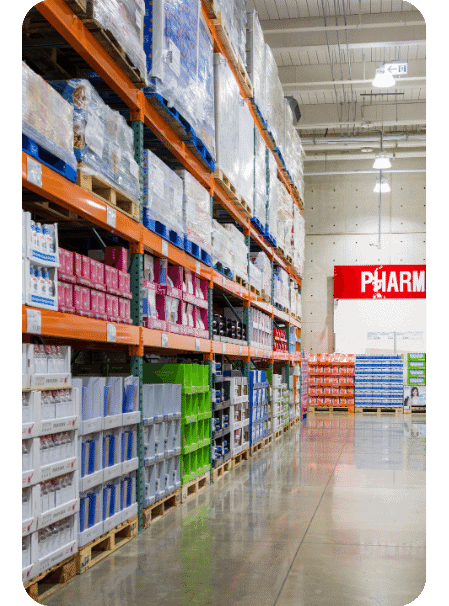 A club store is any members-only retail establishment offering an extensive inventory of bulk food, grocery, and other goods for sale to individual or business customers. A wholesale company buys large quantities directly from the manufacturer or distributor and stores them for resale to other businesses. Wholesalers receive preferred pricing due to their bulk purchasing that then gets passed on to the customer.
A club store is any members-only retail establishment offering an extensive inventory of bulk food, grocery, and other goods for sale to individual or business customers. A wholesale company buys large quantities directly from the manufacturer or distributor and stores them for resale to other businesses. Wholesalers receive preferred pricing due to their bulk purchasing that then gets passed on to the customer.
Club and wholesale packaging needs can differ from other stores for various reasons. This page will discuss the packaging needs of wholesalers, including:
- Wholesale packaging market’s needs: Wholesale packaging must be durable to hold up to warehousing while still appealing to consumers.
- Design and fabrication considerations: Brand visibility is as essential for secondary and tertiary packaging as it is for primary packaging.
- Industry standards and guidelines: Wholesale packaging companies must adhere to standards set by the Food and Drug Administration (FDA), the Fair Packaging and Labeling Act, guidance from the Sustainable Agriculture Research and Education (SARE) program, as well as proprietary specifications.
- Types of products: Club packaging may vary significantly in design, use, and materials.
- Methods: Methods for creating wholesale food and product packaging can run the gamut, from specialized clamshells to corrugated containers. Requirements vary widely based on product type.
Wholesale Packaging Needs
Competition has become fierce as club and wholesale stores grow in popularity. To keep up with demand, wholesalers need innovative packaging that incorporates eco-friendly designs and high-quality graphics. Packaging is essential to the sale of any product, and this is especially true in club and wholesale environments where packaging must influence the decision to buy large quantities of goods.
Some of the common packaging methods used by wholesalers include:
- Point-of-purchase (POP) displays. POP displays are strategically placed near the registers to encourage last-minute impulse purchases.
- Large packages. Bulk sales are often facilitated through large packages that can hold a variety of boxes, bags, bottles, cans, or other goods. The convenience offered by this packaging type makes large-volume purchases less intimidating for the consumer.
- Materials that preserve shelf life. Blister wrapping and shrink-wrapping help to preserve the shelf life of various goods.
Some of the key design considerations when creating wholesale custom packaging include:
- Design aesthetic. Bulk goods should be packaged in a way that doesn’t sacrifice brand recognition or aesthetic appeal.
- Ease of storage. In large warehouse environments, product packaging must often facilitate safe stacking and storage without risking damage to the product.
- Cost. To maintain margins and stay competitive, packaging must allow for wholesale pricing discounts.
- Labeling. FDA standards for food packaging include labeling requirements for nutrition information. Any nutrient content claims, as well as any assertions on health benefits much also comply with specific requirements. Many types of wholesale food packaging, however, fall under individual state requirements and standards.
Wholesale Packaging Methods
Large wholesalers sell a plethora of product types, ranging from dry goods to pet products to perishable food. Some examples of goods commonly found in wholesale stores include:
- Food products. Club stores and wholesalers sell a variety of meat trays, prepared dinners, baked goods, and convenience foods like sandwiches that all require unique and specialized packaging.
- Pet supplies. Pet supplies are an extensive market, from pet foods and treats, toys, and care items like beds, shampoos, or leashes.
- Office supplies. Office supplies may include pens, batteries, paper, printer cartridges, and computer accessories.
- Paper goods. Toilet paper, paper towels, and diapers are popular bulk purchase items at club stores.
With such disparate products for sale, there are a variety of packaging methods available to suit the diverse needs of wholesalers. The most popular methods of wholesale packaging include:
- Shrink wrapping. Shrink wrapping uses heat to reduce plastic film around the contents to keep them fresh or secure. Shrink wrapping is a fast and affordable method for protecting individual items or combining multiple items for sale.
- Flow wrapping. Flow wrapping quickly creates plastic storage bags from a continuous sheet of plastic. The item is wrapped in the plastic and then the ends are cut and sealed with heat.
- Pouch filling and sealing. Popular for chips, snacks, and other food items, pouch filling seals products within flexible plastic or metal foil laminate bags.
Club Packaging Services from Econo-Pak
When your business requires specialized wholesale packaging, Econo-Pak has the reputation, experience, qualifications, and capabilities you need. We are FDA, USDA Organic, and Safe Quality Food (SQF Level 3) certified, ensuring that we can handle packaging for any type of product sold by wholesalers and club stores. Contact us today to see how we can help streamline your wholesale product packaging.







